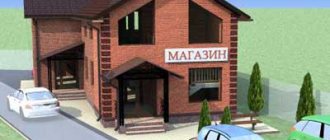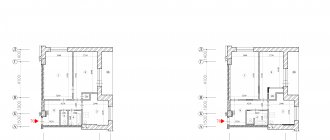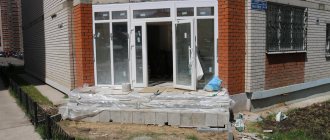Home » Buying and selling an apartment » How to convert commercial real estate into residential and vice versa
14
In most cases, it is easier to sell commercial real estate and use the proceeds to buy housing (and vice versa) than to try to change their status. However, this is not always acceptable for various reasons. As a result, you have to spend time, effort and money to turn, for example, an apartment into an office or a warehouse into a residential building. And it's very difficult. Let's look at the features of the translation procedure in this article.
Features of residential and commercial real estate
Before moving on to the procedure itself, you need to understand the differences between commercial real estate and residential real estate. This is the main factor due to which government agencies often refuse to change the status - real estate is simply not suitable for conducting business or, conversely, for permanent residence.
Residential Properties
Residential real estate refers to either individual buildings (private houses) or apartments in apartment buildings. They are necessarily created taking into account that people will live in them constantly: in winter and summer. As a result, the buildings are equipped with all the required communications. Particularly noteworthy is the heating.
Such premises can be owned by individuals, companies or government agencies, but for the purposes of this article we are more interested only in those that belong to individuals and legal entities, and not to the state. To generalize, simplify and shorten it, the main criterion for a residential premises/building is its suitability for permanent residence of people.
Commercial real estate
Commercial real estate refers to buildings of various types, including individual premises, which are intended primarily for making a profit. This can include production workshops, warehouses, offices, and so on. Their main difference from residential premises is that they are not intended for permanent residence of people. They may not contain the necessary communications or they will be presented in a minimal amount.
Example: Office space is used to support the work of a company. Employees work there for a whole year, but are not in the office 24/7. There may be heating, electricity, water supply and sewerage, but most likely there will be no gas. In addition, such premises are equipped with minimal communications and almost never have sleeping places. As a result, they are not suitable for permanent residence.
Administrative and judicial procedure for transferring a non-residential building into a residential one
By and large, the procedure for converting a non-residential building into a residential one is quite simple. However, we all understand that each specific case may have its own nuances, which may increase costs, both time and financial. In this case, it is worth taking into account the Administration’s comments and following their recommendations, because in the event of a refusal to transfer administratively, the only way will be to go to court, and this is a completely different story, although it is also in demand.
How to convert commercial property into residential?
Converting commercial real estate to residential property is a more complex task than the reverse procedure. At a minimum, because commercial buildings do not have the necessary communications and, most importantly, the surrounding infrastructure. In theory, you can equip an office with beds, convert it into a room and add all the necessary elements, even a kitchen.
However, the owner of such a premises will not be able to create the necessary infrastructure in the area of the commercial building: green spaces, playgrounds, shops, garbage cans, parking lots, and so on. Simply put, it is still possible to turn a residential property into a commercial one, but the reverse procedure will be much more difficult (but provided that this building/premises was not previously residential).
Real estate requirements
Basic requirements for real estate in order to be able to turn it into a residential house/apartment:
- Isolated from other rooms or buildings. There must be windows and doors that prevent other persons from accessing this room/building.
- Main walls are required.
- There must be all the necessary communications: electricity, water, sewerage, heating, gas and so on. In some regions in which it is not possible to connect centrally, for example, to water or gas supply, the requirements may be somewhat simplified, but the absence of any type of communications must be compensated. For example, if there is no gas, then there must be electricity, which will ensure the functioning of electric stoves and other similar household appliances. If there is no water supply, then you must have your own well with a pump, and so on.
- The building/premises must comply with all technical, sanitary and fire standards. Their list is very extensive and largely depends on the region where it is located, the type of structure, the materials used in it and other parameters. There is no point for the owner to bother himself with all this information, because he will still have to do a redevelopment, which will be designed by specialists. They must take into account all existing requirements. In practice, only 1% of all commercial premises can be considered residential without making any special changes.
- The premises must be the property of the person who plans to make it residential. Considering the fact that most commercial real estate is not purchased, but rented, this clarification is very important. The tenant has no right to change the status of the building/premises he rents.
- The property must not be seized or encumbered. This is especially true for those objects that were previously pledged. You will have to check the building/premises for any encumbrances.
Procedure
- Order a project for redevelopment of the premises, taking into account its transfer to housing stock.
- Get the project and carry out the redevelopment carefully taking into account all the features, including small nuances.
- Issue a new registration certificate for the property, created taking into account all changes made.
- Collect other documents for future housing.
- Submit an application for transfer of real estate to housing stock.
- Send the application and other documents to the local administration.
- Wait for a decision.
- Based on the decision, make the necessary changes in Rosreestr.
- Receive new documents for real estate.
Documentation
To transfer commercial real estate to housing stock, you need to prepare the following documents:
- Application (see sample below).
- Passport of the owner/owners. If the property is owned by a legal entity, then additional constituent documents will be required, as well as papers confirming the fact that the applicant has the right to perform such actions (transfer the property to housing stock). For example, minutes of the founders’ meeting.
- Notarized consent of the co-owners (relevant if the property has several owners).
- Extract from the Unified State Register of Real Estate (the fresher the better). This document simultaneously confirms ownership of the property and shows the presence/absence of encumbrances.
- Title documents for non-commercial real estate (sale and purchase agreements, donations, etc.).
- Technical passport.
- Cadastral plan.
Application for transfer of commercial real estate to housing stock
This type of application is usually completed on site, right before submission. The form and content may differ depending on the region where the non-residential property is located. The sample below is for informational purposes only. Before submitting the document, it is recommended to clarify the form of this type of application accepted in the given administration.
Content
The application usually includes the following information:
- Where is the document sent?
- Applicant information.
- Information about the property that needs to be converted into housing stock.
- Applications.
- Date and signature.
Sample
Deadlines
Collecting documentation, creating a project and subsequent redevelopment can take from several weeks to several years (depending on the required amount of work). Then everything will go a little faster:
- After submitting an application, a decision on it must be made within 45 days.
- Making changes to Rosreestr based on the administration’s decision will take about 2 weeks.
- Receiving new documents (in particular, a new extract from the Unified State Register) will take another 3 to 5 days.
Real estate requirements
The requirements for residential premises are established in section 2 of the Government of the Russian Federation Decree No. 47 of January 28, 2006.
The property must meet the following characteristics:
- presence of main walls;
- isolation from other premises and buildings;
- equipment with all necessary communications (water supply, electricity, gas, sewerage);
- compliance with sanitary, technical and fire standards.
Reference!
If there is an encumbrance on the premises, then the transfer of commercial real estate to residential real estate will be refused. Civil servants will not give permission for the procedure in the following cases (Article 24 of the RF Housing Code):
- the necessary documents are missing;
- the citizen contacted a government agency that is not involved in this issue;
- the conditions for converting commercial real estate into residential real estate have not been met;
- reconstruction or redevelopment work has not been completed.
The decision to refuse must be sent to the applicant within 3 working days after acceptance. A citizen has the right to appeal it in court.
How to convert residential premises into commercial ones?
As mentioned above, converting a residential space (apartment or private house) into a commercial one is somewhat simpler. But this also has its own characteristics, rules, requirements and conditions.
Housing requirements
- If the option of converting an apartment into commercial real estate is being considered, it should be located only on the first floor of an apartment building. The only exception is made when there are already other non-residential premises under the apartment in question.
Example: The housing under the target apartment was transferred to non-residential stock for the creation of a beauty salon. Now the target apartment can also be made non-residential real estate. Immediately after this, the apartment on the next floor, above the one in question, can also become non-residential, and so on.
- The entire apartment or house is transferred to non-residential stock. You cannot make part of a house/apartment non-residential and leave the rest residential. The exception is options when it is possible to allocate a part of an apartment/house in nature, provide such premises with separate communications and, most importantly, a separate exit to the street.
- In the case where the housing area is more than 100 sq.m., an emergency exit is required.
- There should be no encumbrances or liens placed on the property.
- The apartment/house must be owned by the applicant.
- The consent of all co-owners will be required to convert housing into commercial real estate.
- The building in which the apartment is located should not be considered unsafe.
- There should be no registered persons in the apartment/house at the time of the procedure for changing the status of real estate.
- Redevelopment of an apartment/house must comply with the technical passport.
As you can see, no special requirements for communications are put forward for the simple reason that in residential real estate they must already be mandatory.
Procedure
To convert residential real estate to commercial you need:
- Prepare a project for the redevelopment of residential premises and complete it (if required).
- Collect all necessary documents.
- Submit an application to change the status of real estate with all documents to the local administration.
- Wait for a decision.
- Based on the decision, make appropriate changes to Rosreestr.
- Receive a new extract from the Unified State Register of Real Estate, which will indicate the changed status of the property.
Documentation
- Passport of the applicant/applicants.
- Power of attorney to perform such actions (if required).
- Title documents for housing (donation agreement, purchase and sale agreement, etc.).
- Extract from the Unified State Register of Real Estate.
- Registration certificate for an apartment or house.
- Cadastral passport (if required).
- Certificate from the Management Company or Housing Office about the status of other premises in this building (if relevant).
- Consent of neighbors to change the status of real estate (a very important document).
- Minutes of a meeting of house residents (in some cases may be considered instead of the consent of neighbors). This document must indicate the clear consent of the residents to change the status of the premises.
- Certificate from the Management Company stating that the house is not recognized as unsafe.
- Certificates from the Ministry of Emergency Situations, SES and other structures stating that the apartment/house meets all requirements.
- An extract from the house register confirms the fact that no one is registered in the apartment/house.
Application for transfer of residential real estate to commercial
An application of this type, as in the previous case with the transfer of commercial real estate to housing stock, may have different form and content depending on the region where the property is located. The sample below is provided for reference only.
Content
This document should contain the following information:
- Where and by whom the document is sent.
- Information about the applicant and the property.
- Application.
- Date and signature.
Sample
Deadlines
In this case, the timing is identical to that described above. The project, redevelopment and collection of documents can take several hours or several years, a lot depends on the property. The decision is made within 45 days, after which changes are made to Rosreestr in about 2 weeks and new documents are drawn up in another 3-5 weeks.
Who can be denied a transfer?
- to those who have not collected a complete package of documents;
- to those whose house is located on a site whose land plot does not provide for the placement of a residential building on it;
- not the owner of the house and plot.
If the transfer is nevertheless refused, the owner will be informed about this three days after the decision is made. After this, he can either complete the package of documents (if the reason for the refusal is this), or bring the house into compliance with the requirements for communal facilities, or go to court. But first, we recommend contacting the profile section of FORUMHOUSE, where you can get help from a consultant or person , who has already gone through this entire procedure and knows how to act in the best way in your case.
Subscribe to our Telegram channelExclusive posts every week
What is the price?
The cost of changing the status of real estate largely depends on how much money will need to be spent on redevelopment and subsequent improvement of the building/premises. This is precisely the main expense item. Figures can vary from several thousand rubles to millions. The remaining costs are not so significant, especially since the procedure for changing status itself is carried out by the administration free of charge:
- Notarization of the consent of each co-owner: 1-2 thousand rubles.
- Registration of a power of attorney: from 2 thousand rubles.
- Drawing up a real estate redevelopment plan: from 5 thousand rubles.
- Registration of a new technical passport: from 5 thousand rubles.
- Making changes to Rosreestr: 2 thousand rubles for each owner.
- Obtaining a fresh extract from the Unified State Register of Real Estate: 350 rubles.
Underwater rocks
Citizens need to take into account the following nuances:
- Only the owner of the property or his representative can change the status of a commercial premises to residential. The latter must have a notarized power of attorney to perform such actions.
- Refusal to accept documents and amendments may be appealed in court. The claim is filed at the location of the property. It is important to comply with the deadlines established by law.
- The administration employee considering the issue independently submits the documents to Rosreestr for amendments. The owner can speed up the procedure by independently contacting a government agency or submitting a package of papers through the MFC. After this, you need to visit Rosreestr to obtain an extract from the Unified State Register of Real Estate.
Is it possible to use commercial real estate as residential and vice versa without changing its status?
In most cases, it is not possible. An exception is made only for certain types of activities, such as tutoring, legal practice, and so on. And then, this is only possible when such activities do not disturb the neighbors. In all other cases, when attempting to use premises/buildings for other purposes, fines are imposed:
- Use of housing for other purposes: a fine of 1 to 1.5 thousand rubles (in accordance with Article 7.21 of the Code of Administrative Offenses of the Russian Federation).
- If the property is used for other purposes and in violation of the rights of neighbors, one may lose the property altogether.
- For using a residential premises as a non-residential property, provided that it is owned by a legal entity, the fine will be about 40-50 thousand rubles (Article 7.22 of the Code of Administrative Offenses of the Russian Federation).
- Permanent residence of people in commercial real estate that is not intended for this entails a fine of about 10-20 thousand rubles, and so on. It is much easier not to try to break the law, but to carry out redevelopment and change the status of the property. And if this is not possible, sell it and purchase a more suitable object.
Considering everything said in this article, we can conclude that the transfer of housing to commercial real estate and the reverse procedure are very complex actions that are practically impossible without the help of an experienced lawyer. At a free consultation, our specialists will talk about the main important points that should be taken into account. They can also take on the entire procedure for changing the status of an object and will even defend the client’s interests in court, if necessary.
FREE CONSULTATIONS are available for you! If you want to solve exactly your problem, then
:
- describe your situation to a lawyer in an online chat;
- write a question in the form below;
- call Moscow and Moscow region
- call St. Petersburg and region
Save or share the link on social networks
(
2 ratings, average: 5.00 out of 5)
Author of the article
Natalya Fomicheva
Website expert lawyer. 10 years of experience. Inheritance matters. Family disputes. Housing and land law.
Ask a question Author's rating
Articles written
513
- FREE for a lawyer!
Write your question, our lawyer will prepare an answer for FREE and call you back in 5 minutes.
By submitting data you agree to the Consent to PD processing, PD Processing Policy and User Agreement
Useful information on the topic
24
State duty when buying or selling an apartment
Concluding a transaction for the purchase and sale of an apartment is not only about paying the cost...
3
How best to arrange an apartment: donation or purchase or sale to a relative
Any real estate transaction has its own characteristics and potential problems...
2
Is it possible to sell an apartment with debts on utility bills?
Debts for utility bills, provided that the apartment does not…
5
Refusal to purchase a share in an apartment
In some cases, before selling an apartment or a share in...
19
Transfer of money when buying and selling an apartment
One of the most risky and responsible moments of completing a purchase and sale transaction...
4
Purchase and sale of municipal housing
Apartments are very expensive and not always affordable...










